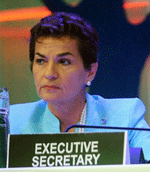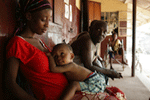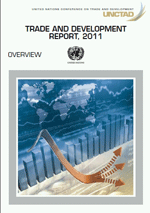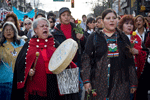Social Watch News
Published on Thu, 2011-10-13 17:08
Far from improving the quality of life of the world population, increased trade and per capita income have not resulted in reduced poverty, according to the most recent Basic Capabilities Index (BCI) published by Social Watch, an international network of civil society organizations. |
Published on Thu, 2011-10-13 17:00
What do Costa Rica, Uruguay and Georgia (the country in the Caucasus, not the American state) have in common? They all have achieved high positions in their social indicators while keeping their emissions of climate changing carbon dioxide at less than half of the global per capita average. |
Published on Thu, 2011-10-13 16:50
“The hard numbers have proved that prosperity does not trickle down,” said Roberto Bissio, coordinator of Social Watch, at the launch of the Basic Capabilities Index computed by this non-governmental watchdog organization. “It used to be common sense that a growing economy benefits the poor, that a rising tide will lift all boats, big or small, or that the pie has to grow first before we can share it,” he added, but the figures published by Social Watch on the eve of the international days on hunger and poverty seem to show the opposite. |
|
Published on Tue, 2011-10-11 12:10
The following strategy paper is based on the input from the various discussions in the 5th Global Assembly of Social Watch, held in Manila, Philippines in July 12 to 15, 2011. |
Published on Tue, 2011-10-11 07:54
The Third World Network (TWN, point focal of Social Watch), “do not support any outcome” of the negotiations on climate change “that undermines or terminates the Kyoto Protocol, or that enshrines a weaker system than the Kyoto Protocol in international law,” according to the statement the group published on the occasion of the Ad Hoc Working Group on Long-term Cooperative Action under the Convention on Climate Change (AWG-LCA), held last week in Panama City. |
| Published on Fri, 2011-10-07 10:45 |
Published on Fri, 2011-10-07 08:24
The brain drain, the lack of appropriate facilities, equipment and drugs and the inequity in the access to the services between urban and rural populations hinder Africa from reaching the health-related MDGs, warned the Third World Network-Africa (TWN-A, organization based in Accra that integrates Social Watch). Governments should focus “as a matter of urgency” on the maternal and child healthcare services as first steps. |
Published on Fri, 2011-10-07 08:22
An UNCTAD report warns against fiscal rigour as a suicidal policy, since it “weakens recovery, hampers improvement in public revenues and even reduces fiscal revenue by hindering economic growth. However, as Roberto Bissio argues in his column for Agenda Global, the fiscal rigour fashion is spreading not only among rich countries that are heavily indebted but now also among developing countries that do not have this problem. |
Published on Thu, 2011-10-06 08:13
The European Parliament’s Committee on Petitions discussed on Tuesday a formal complaint submitted last year by the Campaign Against Homophobia (KPH, focal point of Social Watch in Poland) against the regulations that prevent same-sex couples to formalize their relationship abroad. |
Published on Wed, 2011-10-05 09:13
The Sisters in Spirit, part of the Native Women’s Association of Canada, dedicated this Tuesday, like every Oct. 4 since 2005, as a day of vigil to honour the lives of missing and murdered Aboriginal women and girls, with rallies and other events in nine provinces including Ontario, Alberta, British Columbia, Quebec and Nova Scotia as well as the Northwest Territories. |
SUSCRIBE TO OUR NEWSLETTER










